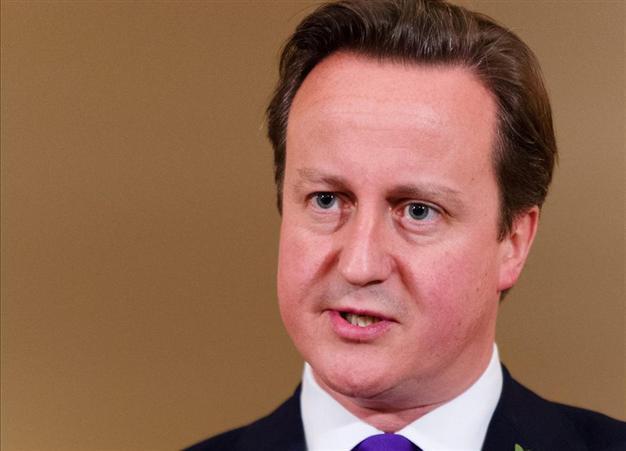Britain says would agree safe exit for Syria's Assad
DAMASCUS - Agence France-Presse

EPA photo
Fresh bombings and air strikes shook Syria today as British Prime Minister David Cameron said he would support granting Bashar al-Assad safe passage if it meant ending the country's bloodshed, AFP reported.
A day after nearly 250 people died in the country's worst unrest in weeks, Cameron said on Al-Arabiya television that he wanted the Syrian leader to face international justice but that Assad's departure could be arranged.
Asked what he would say if Assad asked for a safe exit, Cameron told the Saudi-owned channel: "Done. Anything, anything to get that man out of the country and to have a safe transition in Syria." "Of course, I would favour him facing the full force of international law and justice for what he's done," said Cameron, who is on a tour of the Middle East.
"I am certainly not offering him an exit plan to Britain but if wants to leave, he could leave, that could be arranged." The under-pressure Syrian National Council was meanwhile insisting it keep its leading role in the opposition, as its members gathered for crucial talks in the Qatari capital Doha.
The SNC pushed back at US complaints it is not representative, with the umbrella group's head Abdel Basset Sayda saying it must remain the "cornerstone" of the Syrian opposition.
Opposition figures are later to discuss an initiative by leading dissident Riad Seif -- and reportedly backed by the US -- to unite all Syrian groups opposed to Assad and form a new government-in-exile.
On the ground in Syria, two more car bombs struck today near Damascus, with the regime still reeling from rebel bombings and attacks that killed nearly 100 soldiers and pro-government fighters on Monday.
One exploded in the city of Mudamiya near the capital, causing injuries and significant damage, the Syrian Observatory for Human Rights said.
A second was detonated in the southern Damascus suburb of Sayyida Zeinab, causing damage but no casualties, according to the Britain-based Observatory, which relies on a countrywide network of activists and medics.
The regime also renewed air strikes pounding rebel positions, with bombs dropped in the suburbs of Damascus, the central town of Houla, the northern province of Aleppo, the eastern city of Deir Ezzor and the northwestern region of Idlib, the Observatory said.
The rebels have scored significant gains in recent weeks and hold swathes of territory in the north, but have come under intense bombardment from the air.
The Observatory said 247 people were killed on Monday, including 93 soldiers and pro-regime fighters, in the deadliest day in Syria since an attempt to impose a ceasefire for the October 26-29 Eid al-Adha Muslim holiday collapsed.
In one of the most devastating attacks on Assad's forces since the start of the Syrian uprising, a rebel car bomb killed 50 pro-regime fighters at a military post in the central province of Hama on Monday.
The watchdog gave an initial toll of 49 people killed nationwide today, as fighting raged again around Damascus, in northern commercial hub Aleppo, near the northwestern Wadi Daif military base and in other areas.
The Observatory says more than 36,000 people have died since the uprising against Assad's rule broke out in March 2011, first as a protest movement inspired by the Arab Spring and then as an armed rebellion.
International efforts to halt the violence have been frustrated by disagreements, with Russia and China blocking attempts by Western and Arab countries to put more pressure on Assad.
Moscow has accused the United States and Arab countries of coordinating weapons deliveries and supplying arms to the rebels, and Foreign Minister Sergei Lavrov on Tuesday said opposition fighters had acquired 50 Stinger shoulder-fired missiles.
Speaking after talks with officials and Syrian dissidents in Amman, Lavrov said the missiles were in no way "intended for defence" and could be used to target regime aircraft or civilian planes.
UN-Arab League peace envoy for Syria Lakhdar Brahimi meanwhile said today he feared the country's "Somalisation".
"Some are talking of the danger of seeing Syria divided... I think the real risk is not partition but 'Somalisation', with the collapse of the state and the emergence of militia and armed factions," Brahimi said in an interview with the London-based Al-Hayat Arabic newspaper.
